

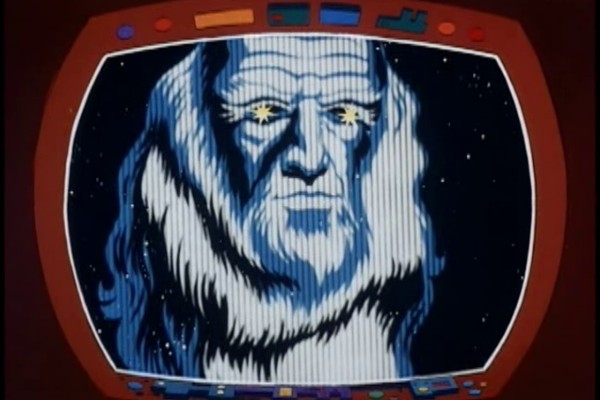
Despite its title attempting to cash in on the late 70s sci-fi boom, Space Sentinels wasn't really much of a "space" show. The beauty of it was that if the crew wanted to travel anywhere, they were ejected from the ship at selected coordinates, and expected to find their own way there using their rocket belts. The notion of having a working spaceship that does nothing but sit stock still at the bottom of a dormant island volcano is pretty original... having the spaceship fly is not.
The Prime Sentinel is the first episode to see the ship move, and it begins a seven-episode run wherein all but one of them has the ship moving; be it underground, underwater or in space. They team up with another group of sentinels from an alien planet, attempting to stop something called "the force" from overtaking the Prime Sentinel.
One thing that makes Space Sentinels really work is that it's such a strange hybrid of a show... in many senses it's a superhero show, but it doesn't feel like one, as the crew have no secret identities or any real existence outside of their heroic lives. Having it turn into a space opera is perhaps a refreshing change of format, but does make it feel a little less "special".
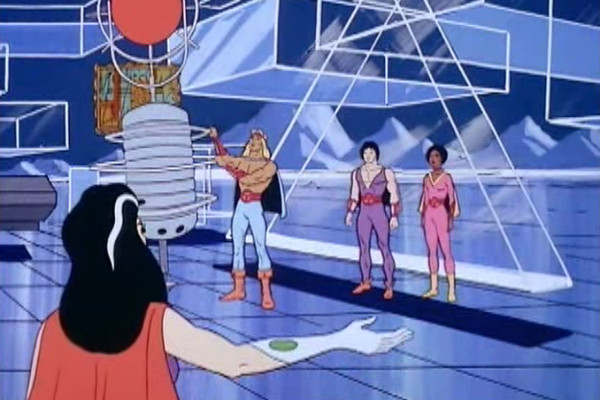
One frequently misunderstood criticism of a lot of modern television is when demographics are artificially contrived. Those noting such matters are often misinterpreted (sometimes wilfully) as expressing a desire not to see more minorities on TV, particularly in social media battlegrounds like the polemic world of Twitter. While this may, sadly, be the case for some viewers, here at The Anorak Zone, the question simply is: does it seem real? Many TV shows have line ups that feel "committee regulated" and so draw attention to the artifice, leaving viewers feeling patronised or disengaged from the series as a believable work of fiction.
Such examples range from a large number of US TV shows that have casts that are far too photogenic to exist together in real life (law of averages), or, here in the UK, series like the remake of Survivors (2008), which featured a carefully selected demographic group that appealed to the widest possible audience. While likeable, it stretched credulity that such a diverse group of people could realistically be a band of seven random survivors in a country where the population is still 85% white. (Though, in fairness to that series, the bigger cities of England are more racially diverse).
It's a shame, because when TV shows get this right, the diverse groups allow for more differing stories. Space Sentinels is one such show: the three characters are ethnically diverse, though as a child watching the series, it never felt "forced" or artificial. In fact, while Astraea is black, Hercules is possibly of Swedish ancestry (The Time Traveler has Mercury joke that he should look like a rutabaga) and Mercury is Chinese (albeit voiced by Evan C. Kim, an actor of Korean decent) it's never particularly referenced in the show, it just is.
While Mercury does have a tendency to try out karate through a fair number of the episodes (it was the 70s, after all), his ethnicity is only referenced twice, with The Wizard of Od seeing Hercules claim the place is a "Chinese puzzle". "Don't look at me," quips Mercury, "I'm as lost as the rest of you." The other reference comes here, with Mercury using his speed to crash a barrier, and noting "whatever it is... I hope it doesn't like Chinese food."
It's refreshing, because the series goes all thirteen episodes without anyone ever mentioning that Astraea is black... and, for the vast majority of the episodes, she's the most resourceful and successful, frequently having to bail the other two out of trouble. This isn't quite true here, for once, where all three of the Sentinels are overpowered by a computer's "magic", and are only largely successful due to it overloading in a slightly "trippy" instalment.
Lastly, one of the real bonuses of the DVD collection is that it contains PDF scans of the original scripts. The Sorceress is particularly notable in this regard as someone (presumably Les Janson or Chuck Menville, the credited story editors) had written reams of critical notes on the bottom of the script. Blunt suggestions included "don't make Hercules and Mercury so blase and flippant all the time"; "Astraea becoming a walrus to see if North Pole has sunk is too silly"; "not only corny but out of character"; "the plot exposition takes far too long... get to it!" Other concerns involved Astraea being able to talk while in animal form, though these issues were ironed out before it was made.
Curiously, while this episode is credited to Kathleen Barnes and David Wise, only Kathleen's name appears on the original script. In fact, all four of their joint credited episodes (the others being The Time Traveler, Commander Nemo and The Jupiter Spore) have only one of their names on the scripts.
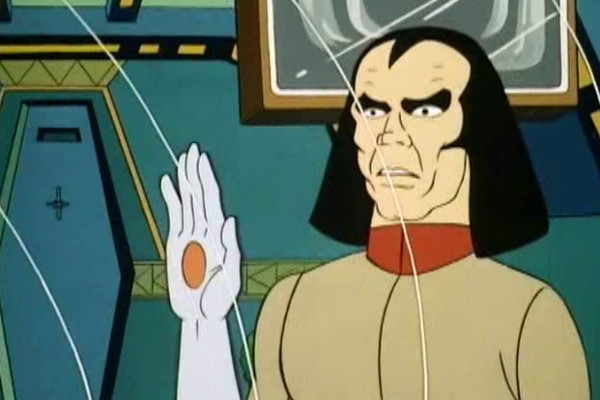
The third episode of Space Sentinels concerns, as its title indicates, a time traveller. (Just one L in the title for accuracy, to reflect how it's written onscreen in US English, but two Ls in the summary for the spelling in UK English). Coming from 1999 - which even the time traveller himself confusingly calls "the future" - the traveller, Kronos, tries to destroy a moonbase in the time of the Space Sentinels.
While a series bible was presumably written, the viewers only find out details of the main characters in small doses. It's here where we get confirmation, for the first and only time, of what year the Space Sentinels live in: it's 1985. However, the sense that this was a carefully planned backstory can perhaps be put to bed with the knowledge that the original script had the date listed as 1980.
After a relatively pedestrian outing, things get wild in the last few minutes, as Kronos is chased back into the prehistoric age by the Sentinels, and is attacked by a very particular T-Rex, who slaps his time device out of his hand and deliberately strips off his time belt. When the T-Rex then decides to eat Kronos, it's up to Hercules to jump in the creature's mouth and hold it open, while Astraea battles it in the form of a Pterodactyl... Mercury, true to form, is still unconscious, dozing off Kronos's sleep ray.
It's wild stuff, made even more intriguing by Kronos's assertion that aliens landed on the moonbase in 1999 and shared secrets with all of the Earth... except for his race, which they regarded as "too war-like". As Kronos, pictured, has a very non-specific look about him, it's not clear what, if any, nationality he's supposed to be. The climax to this crazed instalment sees the crew make cracks about the smell of Hercules's cheese. It's that kind of episode.
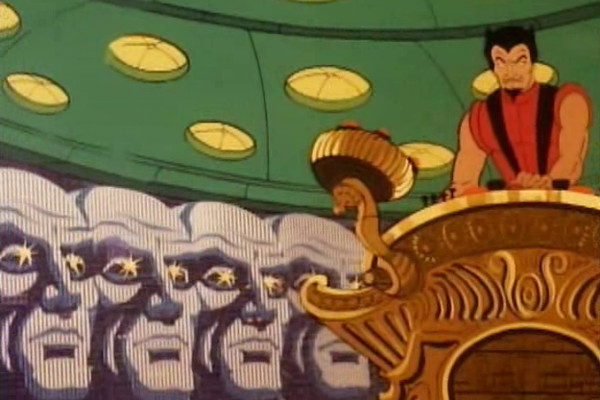
While a light-hearted children's series with a "comedy" robot, there is a deeply sinister undertone to the set up of Space Sentinels. With no real backstory in the show itself, the tale is told in the opening narration, which begins with the lines: "Many centuries ago, three carefully selected young Earthlings were transported from their native lands to my faraway world. Here they were granted astounding powers and eternal youth."
It goes on to explain that they became so well-known, their names went down as legends, so clearly these are the original Hercules, Mercury and Astraea. As all three names go back to BC times, then this means they've spent thousands of years together, trapped in a spaceship having to repeat constant feats while never being able to leave or grow old. Although all three seem content and well-adjusted individuals, spending over 2000 years with the same two people and a couple of computers would surely drive anyone insane... and it's never made clear if they had any choice in being granted these "astounding powers".
Here in the first episode, we meet Morpheus, another name of a Greek God, who was given the job of sentinel before the team, and possesses all of their powers. As this is a show for pre-schoolers, he doesn't use his superspeed to catch up with Mercury and then his superstrength to snap his neck, but instead creates duplicates of Sentinel One, which are eventually defeated. Although Morpheus's characterisation is very much a two-dimensional "baddie", it's hard not to wonder if there's a backstory to be had there, the tale of a man who was given the gift of immortality but chose to reject it.
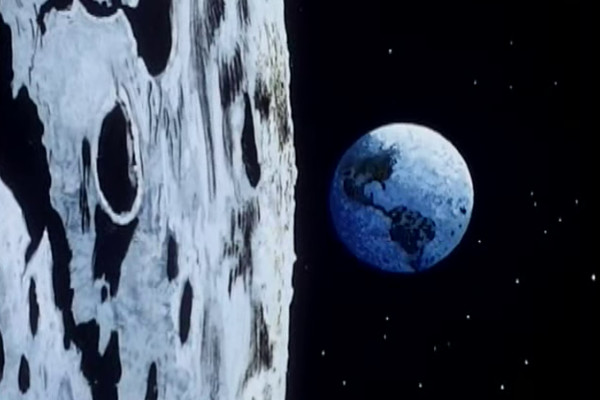
The Worldship closes Space Sentinels' one and only season, though it's not a series with express continuity that has to be followed in order. Rather, it seems they were aired as they were ready, with the programme's scripts shockingly near the transmission deadline. The first submitted drafts of Commander Nemo and this episode were submitted after the series began airing, while a page of The Time Traveler was revised on August 25th, 1977, less than a month before it aired. (For the record, the page in question involved Astrea as a bird, trying to take a cassette from Kronos).
The Worldship is a decent adventure that sees a race of lion-like aliens abandon their planet due to pollution, and propel the ravaged husk through space looking for somewhere new to live. With their planet entering a collision course with Earth, it's up to the Space Sentinels to avert disaster, but while a lesser episode would simply end there, this then gives a second shot of drama: the aliens, woken from suspended animation by the Sentinels, decide they've found the perfect new home: Earth.
The drama is perhaps blunted by the villainous Myar miaowing whenever he's frustrated, but generally this is a decent bow out for a likeable if so-so cartoon series. After this, it was pretty much the end, save for the character of Hercules being carried over to the series The Freedom Force. Voiced by Bob Denison instead of this series' George DiCenzo, he has Pegasus, a flying horse, and new teammates in the form of Isis, Merlin, Sinbad and Super Samurai. Although Space Sentinels aired on NBC, this sort-of follow up was a CBS show, a 12 minute cartoon featured as part of a Tarzan and the Super 7 line-up, which included The New Adventures of Batman and Jason of Star Command. Although the overall series had a successful run, The Freedom Force did not: it ended after just five episodes.
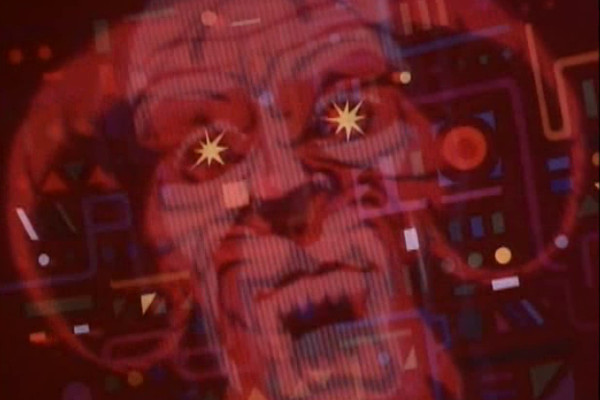
On a personal note, I was a very small child when I first saw this series, and so was, naturally, more hooked into the various situations and events. This episode features an elf from another dimension who tells the Sentinels of an-out-control wishing machine that distorts reality and leads to eerie events like a chair that turns into a giant hand.
With many new characters and environments, this one cuts back on the reused footage, and rattles along at a fair pace. However, watched as an adult (albeit an adult still childish enough to watch old 70s cartoons and write about them on the internet) it's clear that this is an attempt at a more "wacky", overtly comedic episode. Writer Michael Reaves is one of the production personnel interviewed on the DVD release, and describes it as a "throw anything at the wall and see what sticks" story, which had to be written in a single day due to strict deadlines.
Yet that small child - who was, after all, this show's intended audience - was unsettled at the disturbing sight of Sentinel One being transformed into a malevolent clown, or, worse, the form of the Devil, as pictured. Seen today and it doesn't really hold up as well as some of the other episodes, but here's a top two placing for that unnerved young kid, all those years ago.
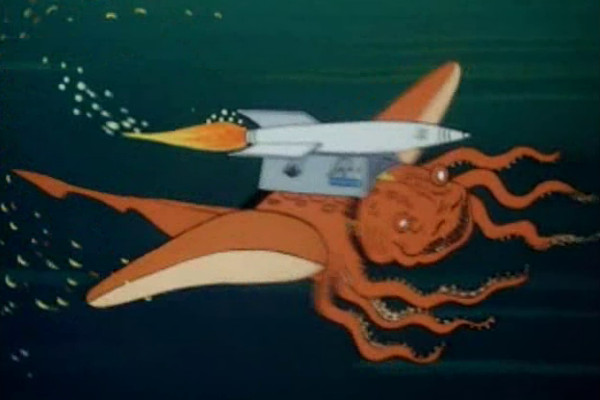
Space Sentinels' most demented episode concerns Commander Nemo (not to be confused with Jules Verne's Captain Nemo, of course) who has an underwater group, The Neptune Society, that are challenging Earth's pollution by destroying buildings that aren't environmentally friendly. How he does this is simple... he gets a mutated sea creature, puts a brain enhancer on it, then straps bombs to its back.
Nemo explains that the creature, "Domino", is so mutated by pollution that none of the other sea creatures love him, and he's his only friend. Domino, as pictured above (the blur an effect on the cartoon to show that he's "underwater") is completely adorable, and his ability to light missiles underwater only adds to the fun. Voice actress Linda Gary has uncredited roles in many of the episodes, and adds to the unintended hilarity with her turn as a "Russian" member of the group, Tiana Nasrudin.
Unusually for the show, Astraea is the one that needs rescuing, but she ultimately saves the day by turning into a seal, and then a giant jellyfish that can grab hold of a nuclear warhead and disarm it with its tentacles. With such an absurd, ludicrous premise, this should possibly be a lot lower down in the ranking, but it's such a bizarre episode that it reaches a level of twisted genius that takes it right to the top spot.
Space Sentinels can be a slightly eerie, almost "cold", or "off-beat" series, so returning to it, it's surprising how many misfiring attempts at humour it contains, from the never-funny antics of MO, down to so many of the endings featuring a "laugh into the credits" fade out. With eight of them concluding this way, it's a surprising change of pace that such a wild episode doesn't. Instead, unusually for a cartoon aimed at 7-year-olds, it's clear that Nemo has had a nervous breakdown, and Mercury assures Nasrudin that "we'll see that he gets the best medical attention possible."